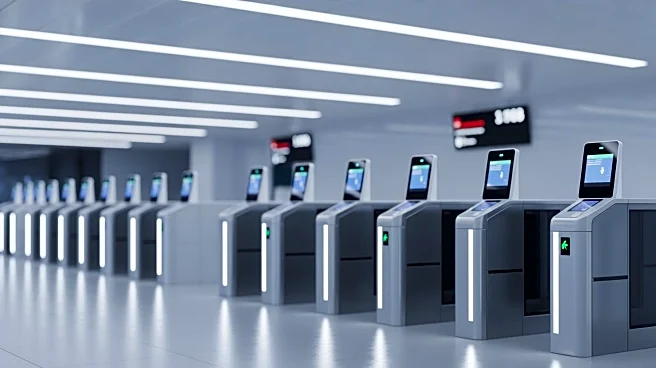What's Happening?
The global market for smart self-boarding gates is projected to experience substantial growth, expanding from $1.35 billion in 2024 to $3.5 billion by 2032, with a compound annual growth rate (CAGR) of
12.1%. These automated gate systems, which incorporate biometric and digital technologies such as facial recognition and barcode scanning, are designed to streamline passenger verification and boarding processes at airports. This technology aims to enhance operational efficiency, reduce wait times, and improve security, while providing a seamless, contactless travel experience. The market is segmented by types, including boarding pass identification and biometric ID identification, and by applications in civil and military aviation. Key players in the market include Wanzl, Dormakaba, and Embross, among others.
Why It's Important?
The expansion of the smart self-boarding gates market is significant for the aviation industry as it addresses the growing demand for efficient and secure passenger processing. The integration of advanced biometric technologies not only enhances security but also improves the overall passenger experience by reducing wait times and facilitating a smoother boarding process. This development is crucial for airports aiming to modernize their infrastructure and meet the increasing expectations for contactless travel experiences. The growth of this market could lead to increased investments in airport technology and infrastructure, potentially benefiting technology providers and airport operators.
What's Next?
As the market for smart self-boarding gates continues to grow, airports worldwide are likely to increase their adoption of these technologies. This could lead to further advancements in biometric and digital verification systems, as well as increased collaboration between technology providers and airport authorities. Additionally, regulatory bodies may need to establish new guidelines and standards to ensure the security and privacy of biometric data used in these systems. The ongoing modernization of airport infrastructure will likely continue to drive demand for innovative solutions that enhance passenger processing efficiency.
Beyond the Headlines
The adoption of smart self-boarding gates raises important considerations regarding data privacy and security. As biometric data becomes integral to passenger processing, ensuring the protection of this sensitive information will be paramount. Furthermore, the shift towards automated systems may impact employment within the aviation sector, as traditional roles in passenger processing could be reduced. This technological evolution also highlights the need for ongoing training and adaptation for airport staff to effectively manage and operate these advanced systems.










